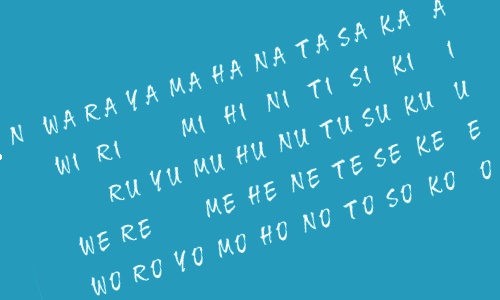This topic seems to be somewhat of a debate - though why that is: I don't know. For those of you who are just beginning, you may or may not know that Romaji is a representation of Japanese sounds using the roman alphabet.

Before I jump into the explanation of why it's bad, allow me to begin with the reasons it helps in the beginning of your journey first. While limited, romaji does have its uses in the beginning:
- When you are first beginning to learn Japanese, (and I do mean at the very beginning - as in you can't read katakana or hiragana yet) it can be useful. After all, the letter set is familiar and helps to speed along learning Japanese sounds.
- It's used for typing. That's right, typing in Japanese for most folks who aren't Japanese will typically be done through an IME (or Input Method Editor), which takes the romaji you type in and helps convert it to kanji and kana. You could get an actually Japanese keyboard that allows input via kana, but it's going to be slower at first until you are really good with it.
- You could technically learn to speak Japanese with it. However, using romaji only has the major drawback of leaving you illiterate. With this in mind, you might as well do it the right way from the beginning (or, at least, very near to the beginning).
...and that's pretty much it.
Once you learn the kana, there really is no excuse to ever use romaji again. Not only will using kana furigana {{1}} style help you learn kanji as you go, but it will reinforce your kana knowledge as well. It's the whole two-birds-one-stone thing.
Now, a list of some of the major drawbacks on using Romaji:
- It will leave you illiterate in Japanese. Literally (see what I did there?), reading street signs will be impossible. Isn't learning a new language kind of pointless to learn it if you can't read it as well?
- Most others who know Japanese won't be able to easily (or maybe not at all) understand what you're writing to them. Because of the limit in the number of sounds in the Japanese langauge, some words sound the same while meaning something different entirely. Kanji and kana solve this problem because you can extract the meaning of the written word from the kanji. If you hear it, you can always ask what the kanji is for a word you don't understand, and obtain its meaning from that. This cannot be done with romaji.
- Reading kanji and kana is faster in the long run. Once you can read kanji and kana, it's actually much, much faster than reading romaji.
- It will make you lazy and uninterested in learning more. Not learning kana and kanji is like trying to build a car if you've never done it before, and know nothing of how it works or what each part does. You'll get frustrated and give up trying to put it together. Simply put: you'll just wind up quitting Japanese. Don't be a quitter, okay? It's not cool.
- When you speak, you may be tempted to speak with an "English" accent. That is, you will more than likely pronounce things incorrectly, since roman letters can have different sounds in English. The same is not true in Japanese, as it has a limited set of specific sounds. For example, if you see the kana for げ, you know it's pronounced "ge" as in GEt, versus "ge" as in GEntle. I'm not saying this won't happen initially with kana and kanji, but it's far less likely.
So, as mentioned above, using romaji is bad for your Japanese health. Exercise your Japanese with real Japanese, not romanized Japanese. Keep your Japanese in shape.
[[1]]Furigana are tiny hiragana written above a kanji to express how the kanji should be read.[[1]]
 Before I jump into the explanation of why it's bad, allow me to begin with the reasons it helps in the beginning of your journey first. While limited, romaji does have its uses in the beginning:
Before I jump into the explanation of why it's bad, allow me to begin with the reasons it helps in the beginning of your journey first. While limited, romaji does have its uses in the beginning: